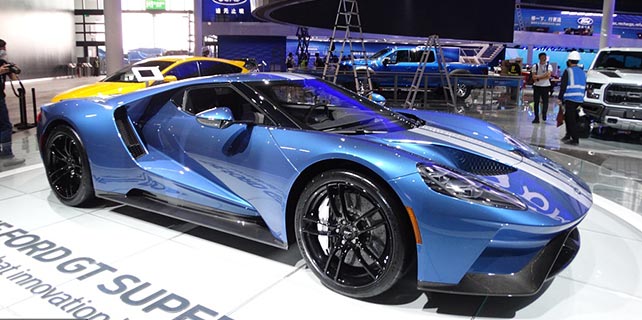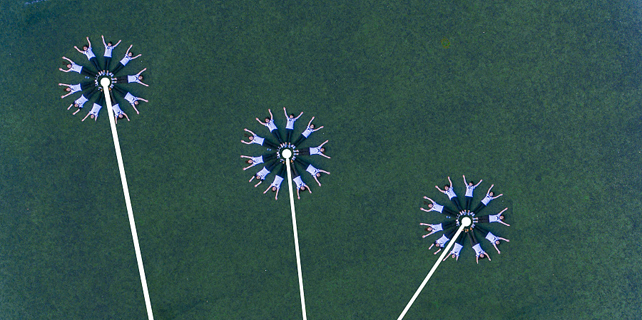China's high-end UAS soars over global competition
BEIJING — Chinese high-end large and medium-sized unmanned aircraft systems (UAS) are gaining a reputation at home and abroad with products such as the Wing-Loong series.
Even before its maiden flight on Feb 27, the China-developed Wing-Loong II was subject to the country's largest ever UAS order, due to its integrated reconnaissance and strike capabilities.
Its capabilities were developed with the self-reliance and innovation of China's aviation industry, which is taking off after mastering core technologies, says chief designer Li Yidong.
The Wing-Loong series grabbed global attention with a range of models at the 2016 China Airshow.
The cross-generational Wing-Loong II had a successful maiden flight in the spring in 2017 with a model tailored to the requirements of a customer who lodged the order beforehand.
Pioneer in wartime, engineer in peacetime
Wing-Loong II's successful maiden flight marks China's new generation reconnaissance and strike UAS. Following the United States, China becomes another country capable of developing such new generation large reconnaissance and strike UAS.
The Wing-Loong UAS series were developed by Chengdu Aircraft Design and Research Institute (CADI) of the State-owned Aviation Industry Corporation of China.
"The Wing-Loong series has a reputation as a 'pioneer in wartime, an engineer in peacetime and versatile everywhere'," says Li, who is also deputy chief designer of CADI.
"Previous models had launched thousands of rounds of various weapons with an accuracy rate over 90 percent," says Li.
The Wing-Loong UAS had endured harsh and adverse conditions, such as scorching deserts, highland gales, high altitude take-offs and landings, as well as mountainous terrain and maritime environments.
They have been equipped by multiple users both domestically and abroad, and have operated in diverse missions, such as counter-terrorism, border patrol and intelligence gathering operations.
One formation of three Wing-Loong I unmanned aerial vehicles (UAVs) conducted a containment and control mission in a war zone around the clock for seven consecutive days.
"Practical combat experience like this is imperative for modifying and developing Chinese UAS equipment, including Wing-Loong and other types of UAS," says Li.
It also builds a reputation in a competitive global market.
Big order before maiden flight
"Getting a big order before a maiden flight is rare in China's aviation industry and globally, which makes us more confident of the cross-generational type of UAS," says Li.
The Wing-Loong II was based on previous Wing-Loong series. A pioneer of turboprop-powered drones, this smart model was capable of fully autonomous horizontal wheeled takeoff and landing as well as cruise flight.
The "standard configuration" of the Wing-Loong II covers a wide range of advanced equipment such as synthetic aperture radar, laser-guided missiles and GPS-guided bombs.
The new UAS comprised the Wing-Loong II unmanned aircraft, ground control station (GCS), mission payload and a ground support system.
Its unmanned aircraft is 11 meters in length, 4.1 meters in height, and 20.5 meters in wingspan. The maximum flying altitude of the aircraft is 9km, with a flying speed reaching up to 340km per hour.
Its maximum takeoff weight is 4.2 tons, with a maximum external carriage of 480 kg and a 20-hour flight time, which make it possible to perform reconnaissance, surveillance and ground strike missions with long-endurance capabilities.
According to Li, it can rapidly identify then strike against time-critical and fleeting targets. The capability is not possessed by previous unmanned aircraft, even manned aircraft."
"Taking a look at the UAS in same class around the world, the Wing-Loong II is equivalent to the US MQ-9 Reaper, and ranks in the first level on the UAS list," Li said.
With a system extension, it can also perform intelligence collection, electronic warfare, search and rescue missions, and has several uses, including military, anti-terrorism, peace keeping, border patrol operations and civilian use.
China to have its say in global sky
"China's innovative core technologies and foreign operation experience make it possible for Chinese high-end UAS products to fly higher," says Li.
Large and medium-sized UAVs must guarantee flight safety in the event of a data-link interruption. "We have gained the technical breakthrough based on China's accumulation in fly-by-wire flight control, advanced navigation, integrated avionics and automatic control."
As high-end UAVs are integrated with emerging technologies, they will continuously enhance their capabilities in the future, says Li.
"Small UAVs will become even smaller to conduct swarm-type operations. Large UAVs will fly much higher and faster, with greater maneuverability or longer endurance. Their adaptability will endow them with bigger roles," he says.
UAVs are expected to carry out operations jointly with manned aircraft.
"To achieve this goal, UAV payloads will surely increase. We expect to see more advanced system intelligence, information transmission, and artificial intelligence decision-making," says Li.
Current technologies restrict most UAVs to pre-planned missions. They urgently need capabilities in emergency treatment, higher situation awareness, and cooperation among multiple vehicles.
"With more outstanding capabilities and deeper technology integration, the smarter UAVs will become."
According to Li, series of China's home-developed UASs, especially those high-end large or medium ones, are under development, production or planning. They will surely fly higher, longer and faster, with greater manoeuvrability or longer endurance.
"Innovation is not a romantic field with roses. We will spare no efforts to put China to have its say in global UAS field with core-tech and innovations firmly in hands," said Li.









